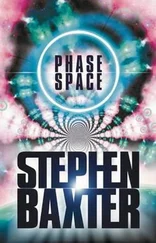One of the youngsters came up to him. It was Gita Weissman, Mike’s granddaughter. She grinned through her translucent faceplate; her skinsuit was what they used to call Day-Glo orange.
‘Dust,’ she said. ‘It’s always the dust.’
‘Yeah.’
‘Grab a pump. We want to get this baby back on line or we’ll miss quota again.’
He started to prepare a vacuum-pump tube.
The ‘dust’ was surface rock flour: half of it invisible to the naked eye, abrasive, and electrostatically sticky. Despite their best efforts it had gotten all the way through the interior workings of Ra, coating every surface.
A lot of Earthbound experience was worthless up here. No machine, for example, which used its own weight for leverage was going to be any use. Nevertheless, some terrestrial technologies, like coal gasification, had proven to be good bases for development of systems that gave a low capital investment and a fast payback.
Greenberg remembered how they’d celebrated when the ore processors had first started up, and water had come trickling out of crushed and heated asteroid cinder. It had touched, he supposed, something deep and human, some atavistic response to the presence of water here, the stuff of life in this ancient rock from space.
Whatever, it had been one terrific party.
And this rock, and many others like it, had proven to be as rich as those old sci-fi-type dreamers, who Greenberg used to laugh at, had hoped. Ra was fat with water – twenty per cent of its mass, locked up in hydrate minerals and in subsurface ice. It exported kerogen, a tarry petrochemical compound found in oil shales, which contained a good balance of nutrients: primordial soup, they called it. Ra pumped out hydrogen, methane, kerosene and methanol for propellants, and carbon monoxide, hydrogen and methane combinations to support metal processing …
And so on.
Ra was just a big volatiles warehouse floating around in the sky. And with the big surface mass drivers that Greenberg called softball pitchers, Ra products were shipped to places that were volatile-poor – like Mars, lacking nitrogen, and the Moon, dry as a desert. It was a lot cheaper to export them from a rock floating around up here than from all the way at the bottom of Earth’s gravity well.
To Greenberg’s great surprise, Ra’s inhabitants had become rich.
The first justification for opening up the rocks had been to make them serve as short-term resource factories to aid in the colonization of the Moon, Mars and beyond. But it wasn’t working out like that. Sure, the gravity well colonies were in place, but they were hardly thriving; they were always going to be dependent on key volatiles shipped in from somewhere else. And they didn’t have much to trade; Ra could purchase high-grade metals much more cheaply from other rocks.
There were actually more humans living in the rocks now than on the Moon or Mars. And Ra had more trade with other rocks than anybody else – even Earth …
He saw there was one articulated joint on the splitter boom that was giving particular problems; its prophylactic cover had been taken off, revealing a knobby joint with big, easily replaced parts, already half-dismantled, like the knee joint of a T Rex.
The youngsters were talking about more advances in technology. Like nanotech miners which would chomp their way through the rock without any human intervention at all. Greenberg kind of hoped it wouldn’t be for a while, though; he preferred machinery big enough to see, and wrestle with. It gave him a purpose, a reason to use the upper-body strength he’d brought up from Earth.
The workers got out of the way of him, and, whistling, he moved into the balky joint with his vacuum line.
Screw Mars, he thought as he worked; he liked it here.
The remnant of the cloud moulded itself into a flattened, rotating disc. Solid particles condensed: ices of water and hydrocarbons in the cooler, outer rim, but only rocky debris in the hot, churning heart of the nebula. Planetesimals formed, massive, misshapen bodies that collided and accreted as they raced around the new sun.
And, out of the collisions, planets grew: rocky worlds in the hot centre, volatile-fat giants further out. A powerful wind blew from the sun, violently ejecting the amniotic remnants of the birth cloud. Planetesimals rained down on the surfaces of the new worlds, leaving scars that would persist for billions of years.
The gravity of young Jupiter plucked at the belt of planetesimals further in, preventing their coalescence into larger bodies. So, in the gap between Jupiter and Mars, the planetesimals survived as asteroids: rocky chunks closest to the sun, volatile-rich snowballs at the outer rim, moulded by impacts with each other, melted by radioactivity and electrical induction.
And it was to the asteroids that the starship came: after billions of years drifting like a seed between the stars, still running from the supernova, exhausted, depleted, its ancient machinery cradling the generations that swarmed within, evolving, never understanding their plight.
The nanobugs woke him; with reluctance he swam up from dreams of sunlit days with his daughters on the beaches of Galveston.
He emerged into a gritty, unwelcome reality. Here he was: half a man, with his whole lower body replaced by the gleaming box he called his PMU, pipes and tubes everywhere, still rattling around inside his clumsy old hab module.
Not that there could be much left of his original home. That old NASA stuff had mostly worn out after a decade, let alone a thousand years. But the Weissmans, or anyhow the robots they’d assigned to keeping him alive, quietly rebuilt this old box around him, just as they rebuilt him continually, nanobugs crawling through his body while he slept away the years.
Well, the hell with it. He dug out a packet of food – the label reassured him it was chicken soup, and as far as he was concerned that was what it was – and he shoved it into the rehydration drawer of his galley.
He moved to a window, the little nitrogen reaction-control squirters on his PMU hissing softly. The window gave onto a shaft cut through the regolith, which had a massive lid that would swing down on him in case of a solar flare or some such. It gave him a good view of the surface of Ra-Shalom, and a slice of the night side of Earth, and a handful of stars.
Water-blue light glared out of Ra.
When he’d first come here, Ra had been just a lump of dirty carbonaceous stone. Now, the old craters and ravines transformed into a patchwork of windows, roofed over with some kind of smart membrane.
Greenberg could see into the lens-like surface of one of the crater windows. And right now, a few minutes from the aerobraking of Toutatis, the Weissmans were swimming up from the big spherical ocean they were building in the hollowed-out interior of Ra, swimming up to watch a light show hardly any of them understood, probably.
The Weissmans came in a variety of shapes. There were even still a few standard-issue four-limbed humans around. But the most common morphology was something like a mermaid, with the legs – useless, heavy distractions in microgravity – replaced by a kind of fish tail, useful for swimming around in the air, or the interior ocean. A lot of them had gills and never came out of the water at all, and some were covered in fur that streamlined and warmed their bodies.
The Weissmans had done away with every part of the body which wasn’t needed in microgravity. And some had gone further. Some didn’t have hands, or arms. In an age of ubiquitous and one hundred per cent reliable machinery – machinery which could manufacture other machinery – human beings, it seemed, didn’t need to be toolmakers any more.
Читать дальше












